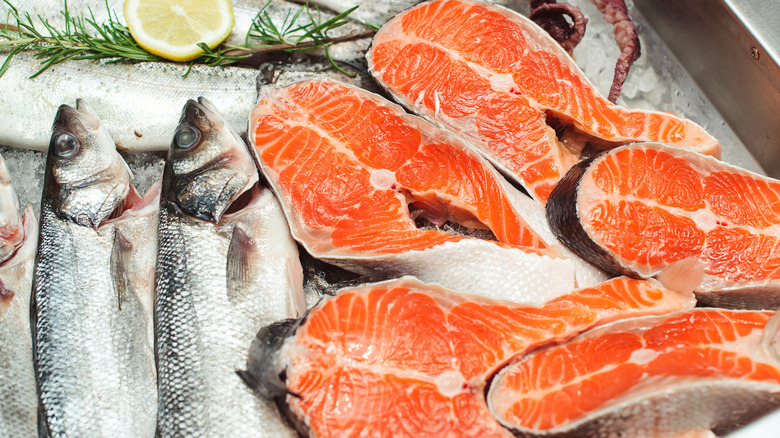Why You Should Think Twice Before Buying Farm-Raised Fish
When choosing fish for your seafood dinner, it's tempting to go for the cheapest option. And while we hate to burst your bubble (and your wallet), that affordable farm-raised fish on sale may require extra consideration before you purchase it. Some studies suggest that farmed fish, such as salmon, have a higher risk of contaminants, pesticides, and antibiotics, as well as lower nutritional value compared to wild fish.
Contaminants pose a risk in both fresh and farmed fish, as they can be passed on to the person consuming them. Farmed salmon are raised in open-net farms at high densities rather than swimming freely in rivers and lakes. As a result, farmers often feed the fish antibiotics to prevent disease outbreaks, which, when ingested by humans, can contribute to antibiotic resistance. According to a 2024 study published in the Journal of Hazardous Materials, the contaminants present also create stronger antibiotic resistance in the fish and increase harmful bacteria in their gut.
Another concern people may have when buying farmed fish is its nutritional value and flavor compared to wild fish. Farmed salmon, for example, are fed a consistent diet of processed fish feed, and their fat content is considerably higher than that of wild fish. This results in a milder taste, a lighter pink hue, and a higher level of omega-6 fatty acids.
The difference between farmed and fresh isn't black and white
While there are differences between wild and farmed salmon, that doesn't mean farmed fish should be entirely off-limits. In fact, some research suggests that the differences between farmed and wild fish may not be as clear-cut as previously believed.
For example, while a 2005 study found higher levels of polychlorinated biphenyls (PCBs) and dioxins in farmed Atlantic salmon compared to wild Atlantic salmon, a later 2022 study in the Journal of Food Quality found the difference to be negligible. Furthermore, a 2024 report from the Food and Agriculture Organization of the United Nations (FAO), the World Health Organization (WHO), and the Norwegian College of Fishery Science found that farmed fish actually contain fewer contaminants than wild fish. Moreover, fish farms in the U.S., Canada, and Chile that supply to Washington state markets now follow strict regulations that have significantly reduced contaminant levels in farmed fish (per the Washington State Department of Health).
Nutritionally, wild fish tend to have higher levels of certain vitamins, such as iron and calcium, while farmed fish contain higher levels of essential fatty acids (EFAs). However, according to a 2018 study, whether or not these EFAs directly contribute to inflammation in the body remains uncertain.
Despite the conflicting research, it's still a good idea to include fish in your diet. Whether it's lemon herb and crab-crusted baked cod or a simple Dijon-crusted salmon, the choice between farmed and wild fish is ultimately up to you.


